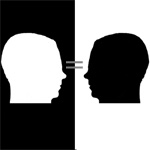The term “O pen Individualism” has a positive ring. If Daniel Kolak hadn’t adopted it, I might have used the word “open” for my own theory of what persons are. I haven’t yet hit upon a term ending in “ism” to represent the idea that persons are informational entities, or (to say the same thing differently) bundles of attributes, as opposed to substances. Like rivers whose constitutive substance (water) is always changing, persons constantly gain and lose attributes. And attributes are easily shared, readily copied from one individual to another. When you learn something from another person, you absorb part of himself. He is a collection of attributes, just as a book (the intellectual work, not the bound volume made of paper) is a sequence of sentences. To learn from another person is like incorporating a quotation from someone else’s book into one’s own composition. In learning from him, we take on part of what he is. The fact that attributes (or information, if you prefer) flow so freely between persons, makes the word “open” appropriate. We are open vessels, not closed ones. Continue reading “Open Individualism – Being Everyone”
pen Individualism” has a positive ring. If Daniel Kolak hadn’t adopted it, I might have used the word “open” for my own theory of what persons are. I haven’t yet hit upon a term ending in “ism” to represent the idea that persons are informational entities, or (to say the same thing differently) bundles of attributes, as opposed to substances. Like rivers whose constitutive substance (water) is always changing, persons constantly gain and lose attributes. And attributes are easily shared, readily copied from one individual to another. When you learn something from another person, you absorb part of himself. He is a collection of attributes, just as a book (the intellectual work, not the bound volume made of paper) is a sequence of sentences. To learn from another person is like incorporating a quotation from someone else’s book into one’s own composition. In learning from him, we take on part of what he is. The fact that attributes (or information, if you prefer) flow so freely between persons, makes the word “open” appropriate. We are open vessels, not closed ones. Continue reading “Open Individualism – Being Everyone”
Kolak: I Am You
 People who think deeply about the puzzle cases of personal identity have come up with a variety of bold and radical responses. Like Alexander hacking through the Gordian knot, Parfit wielded an analytical scalpel to divide personal identity from what matters in personal survival, reaching the conclusion that ordinary survival is about as bad as being destroyed and replaced by a replica. Robert Nozick was so impressed by the difficulties posed by fission cases that he decided personal identity must depend on extrinsic factors: you are identical to whatever person is your closest continuer at any future time, a thesis with the odd consequence that, if your closest continuer after fission dies, you may suddenly find yourself being someone who until that time was someone else, your second-closest continuer. David Lewis’ solution to was to abandon the tried-and-true principle that persons can be counted by counting heads. Since there are two persons after fission, there were two all along, even though, before fission, they occupied the same body and were unaware of their duality. (Bizarre though it sounds, I support Lewis’ solution as one that inflicts the least damage to the traditional concept of a person.) Thomas Metzinger’s analysis led him to conclude that “no such things as selves exist in the world.”
People who think deeply about the puzzle cases of personal identity have come up with a variety of bold and radical responses. Like Alexander hacking through the Gordian knot, Parfit wielded an analytical scalpel to divide personal identity from what matters in personal survival, reaching the conclusion that ordinary survival is about as bad as being destroyed and replaced by a replica. Robert Nozick was so impressed by the difficulties posed by fission cases that he decided personal identity must depend on extrinsic factors: you are identical to whatever person is your closest continuer at any future time, a thesis with the odd consequence that, if your closest continuer after fission dies, you may suddenly find yourself being someone who until that time was someone else, your second-closest continuer. David Lewis’ solution to was to abandon the tried-and-true principle that persons can be counted by counting heads. Since there are two persons after fission, there were two all along, even though, before fission, they occupied the same body and were unaware of their duality. (Bizarre though it sounds, I support Lewis’ solution as one that inflicts the least damage to the traditional concept of a person.) Thomas Metzinger’s analysis led him to conclude that “no such things as selves exist in the world.”
In his book, I am You, Daniel Kolak offers yet another radical theory of personal identity: There is only one person, and that person is all of us. What are commonly understood to be boundaries between individuals, he says, do not “merit the metaphysical significance ordinarily accorded to them.”
Our borders do not signify boundaries between persons. We are all the same person. [Kolak, 2010, p 1] Continue reading “Kolak: I Am You”
